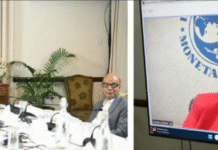‘The then government had conceived the idea of microcredit and established the Palli Karma Sahayak Foundation (PKSF) in 1990 to contribute to alleviate poverty in the country’
Finance Minister AMA Muhith yesterday appreciated the role of microcredit in alleviating poverty as the intervention strategy expanded to a great extent across the country.
The then government had conceived the idea of microcredit and established the Palli Karma Sahayak Foundation (PKSF) in 1990 to contribute to alleviate poverty in the country, he said.
Muhith said the concept was actually based on the success of Grameen Bank as it contributed most part of 4% of the country’s total credit outflow in 1986. But now, microcredit shares 33% of the total credit, he said.
The minister was speaking at a function marking the 24th founding anniversary of Palli Karma -Sahayak Foundation (PKSF) – inaugurating its year-long “Silver Jubilee Celebration” at the Bangabandhu International Conference Center in Dhaka.
He, however, said microcredit cannot be the only weapon to alleviate poverty and, education and health need to be ensured to rid poverty. “But undoubtedly, we can say, it has already kept enough contribution to alleviate poverty.”
About the emergence of microcredit in the country, the minister said Mohammed Yunus introduced it based on the perception that poor people repay the loan properly.
Later, many came forward with the concept, but a number of initiatives were not successful due to lack of capital and leadership.
The government then came up with the concept to set up the PKSF to provide capital for the poor mainly through the partner organisations, he said.
Now, PKSF is providing fund for 272 non-government organisations. The PKSF is providing financial and social services to some 81 lakh entrepreneurs through some 6,619 branches of 272 associated organisations in all upazilas of the country.
The contribution of microcredit now increased to 33% of the total credit outflow, as a result. Five percent is being disbursed among the women.
Muhith said Grameen Bank accounts for only one third of the country’s total microcredit market. “So, we’ll have to admit that microcredit has been expanded in the country to a large extent.”
Primary and Mass Education Minister Mostafizur Rahman Fizar, PKSF chairman and noted economist Dr Qazi Kholiquzzaman Ahmad and PKSF managing director M Abdul Karim also spoke at the programme where more 2,500 education, health, and social development activists and union coordinators attended.
PKSF was established as a ‘not-for-profit’ company with the objective to give funds to various organisations for their micro-credit programme to help the poor who have no land or any credible material possession.
PKSF, also act as a bank of the microcredit institutions, has expanded microfinance to a large extent as it usually provides around TK3,500 crore of credit through its various big and small micro lending institutions. The total capital of PKSF is TK3,321 crore as per the unaudited accounts as of March, 2014.
Addressing the function Kholiquzzaman said poverty is a multi-dimensional problem which requires multi-dimensional intervention including education, health, nutrition, training, infrastructure and financing.
A research shows that the rate of graduation from poverty with support of microcredit only was 9.4% and lately it has reached 10%, he said. In my research, the graduation rate from poverty level with microcredit only was 7%, he said.
“To remove ultra poverty, assets need to be increased. So, it is not enough to give a lump sum amount of money to alleviate poverty. Rather the poor have to be given technology, education, health support and welfare of the children has to be ensured to effectively alleviate poverty.”
He said development and poverty alleviation is a political process and if the political process does not support it then it is not possible to gain its goals.
He said alongside the government’s goal for turning the country into a mid-income one by 2021, there is also a need for turning the country into a mid-living standard one.
The PKSF chairman also viewed that the development plans and their implementation should have to be based on people, not on any industry or institution.
At the function, the PKSF also gave special honour to two renowned educationists — Prof Latifa Akand and Prof Jahanara Haque –for their outstanding contributions to education and women development.
The PKSF was established in 1990 by the government as a ‘not-for-profit’ company with an objective to provide funds to various organisations for their micro-credit programme with a view to helping the poor who have no land or any credible material possession.
Source: Dhaka Tribune










